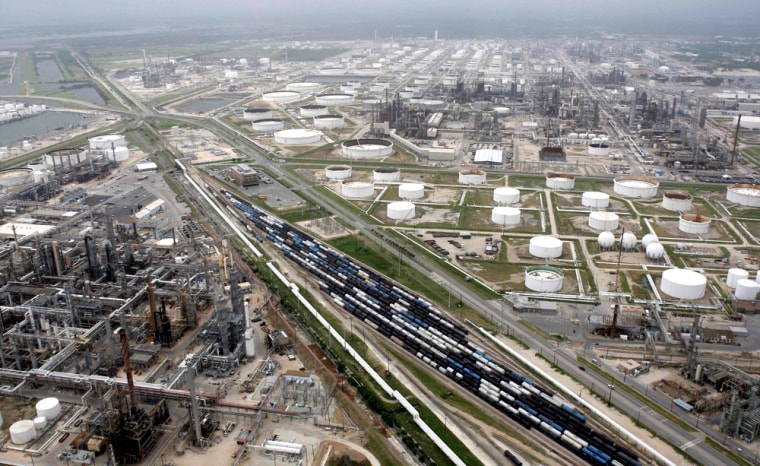As Hurricane Ike bore down on one of the world's largest concentrations of oil refineries, workers scrambled to shut down production and join hundreds of thousands of residents evacuating the area.
The resulting spike in gasoline prices could be short-lived if damage is light. But the longer-term impact won’t be known until the storm passes and floodwaters subside.
After high prices forced consumers to find ways to conserve, demand for gasoline has fallen steadily this summer — and prices had been following the same downward trend. But this year’s hurricane season is putting a crimp in supplies that has sent pump prices surging again.
A shift in Ike’s path Thursday — into a heavy cluster of Gulf Coast refineries — sent gasoline futures surging by 11 cents a gallon, to $2.86 a gallon. Along the Gulf Coast, wholesale prices skyrocketed to nearly $5 a gallon, up from $3 to $3.30 on Wednesday, according to Tom Kloza, publisher of the Oil Price Information Service.
Demand for gasoline usually drops in the fall, and refiners normally cut back on inventories. But gasoline stocks already are at their lowest levels in seven years after refineries shut down ahead of Hurricane Gustav. Any further loss of production could have an immediate impact.
“We've had two hurricanes two weeks apart that have taken out probably 3 million barrels a day of refining capacity or 16 percent of the nation's total,” said oil industry consultant Andy Lipow. “Supplies are going to get thin.”
Forecasters Friday were predicting that Ike, with winds topping 100 mph, would likely hit near Houston early Saturday.
"Hurricane Ike is a gigantic Category 2 monster and is likely to generate a massive and particularly destructive storm surge at key refinery centers," said Jim Rouiller, meteorologist with private weather forecaster Planalytics.
Offshore oil production in the Gulf — still recovering from a shutdown last week ahead of Hurricane Gustav — shut down again for Ike. As of Thursday, more than three-quarters of production facilities had been evacuated and 97 percent of the 1.43 million barrels a day of Gulf oil production was shut down, according to the Mineral Management Service. Production of about 7 billion cubic feet of natural gas has also been halted.
The last time hurricanes shut down as much crude oil and refining production in the United States was in 2005 when hurricanes Katrina and Rita swept through the region and devastated swaths of the Gulf Coast.
Beyond the impact on the oil industry, Ike’s approach also is disrupting traffic in the port of Houston — the second-busiest in the United States. The 25-mile long ship channel is lined with facilities to move cargo to and from destinations around the world. In addition to huge volumes of oil and chemicals, the port is a vital hub for shipment of consumer goods, cars, industrial equipment and supplies destined for much of the nation's midsection. Many ships have sailed from port to avoid potential damage.
"It's safer for vessels to go out to sea to get away from turbulent waters," port spokeswoman Lisa Whitlock said. "If they're stuck in port, they have nowhere to go and can bump against docks."
Other transportation facilities were also bracing for Ike’s arrival. Houston is Continental Airlines’ busiest hub, and the airline canceled numerous flight as the storm approached. Southwest Airlines and American Airlines also canceled flights.
Amtrak cut passenger rail service to parts of Texas and freight railroads closed facilities around Houston. Union Pacific Corp. halted all rail shipments to the city except autos and intermodal containers. The railroad said employees were moving equipment out of the path of the storm before evacuating. Burlington Northern Santa Fe Corp. closed its facility at the Houston port Thursday afternoon for what was expected to be a two- to three-day shutdown.
